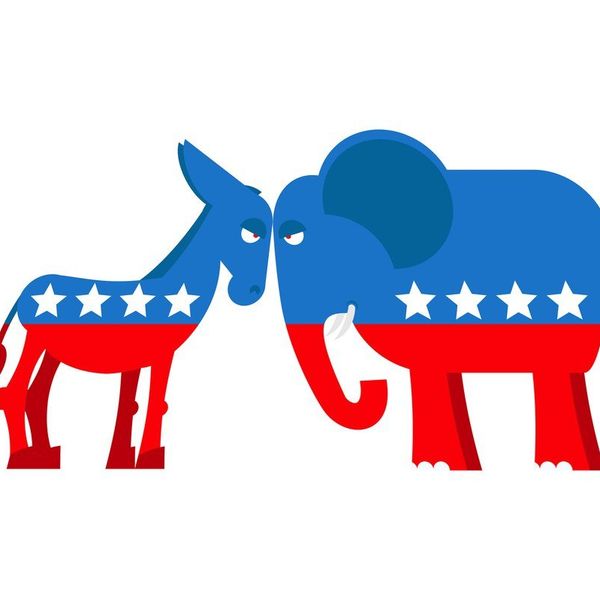It's easy to fall into the trap of thinking that everything is terrible, in part because the news is always running headlines like "THE WORST: IS EVERYTHING THAT?" and "YES." It's especially easy to believe the worst about politics, given the circus-grade ridiculousness of the current primaries and the fact that some things statistically are kinda bad (the parties are more divided than they've been in a long time).
But if we stop clutching our pearls, retrieve our monocles from our teacups, and open a history book, it turns out that this is the same country in which a congressman tried to bludgeon a senator to death on the floor of the Senate, and where most people only ever turned out to vote because politicians got them extremely drunk. The alleged "good old days" were old, and they were days, but that's about it. Ridiculousness has always been a mainstay of our politics (and everyone else's politics, for that matter). Here are four elections crazier than this one.
1. 1800: "Well, It Was A Nice Country While It Lasted."
The 1800 election resulted in an exact tie (73 electoral votes for Thomas Jefferson and 73 for Aaron Burr), meaning that the vote then went to the House of Representatives, where it also resulted in an exact tie. The house voted 34 more times and got 34 more exact ties. And that's not the crazy part.
The crazy part is how apocalyptic this situation must have felt at the time. Put yourself in the shoes of someone living in that era, even though they probably smell terrible. In 1775, America isn't even a country; it's a bunch of British people complaining about taxes. A war most people don't even support.
2. The 1924 DNC: Candidates Burn in Effigy
It definitely gets your attention when you see a protestor wear a Klan hood to a Trump rally, or when you hear the candidate himself fail to disavow the support of a KKK Grand Wizard. But at the 1924 Democratic National Convention, the people wearing Klan hoods were Klan members, and instead of non-denials, they said things like "I support this guy, for I am in the Ku Klux Klan." (Actually, they said things that we would get fired for reproducing here, but you get the idea.)
3. 1828: Mudslinging Invented, Immediately Taken Too Far.
1828 pitted Andrew Jackson against incumbent John Quincy Adams. Jackson had actually beaten Adams in electoral votes and popular votes in the previous election, but without winning a majority; to cut a long story short, Adams wound up President and Jackson wound up really, really mad. This hostility set the tone for 1828, where the level of the discourse was somewhere beneath trading "you mama" jokes in a parking lot (at least those never killed anybody).
4. 1912: President Royale
President Teddy Roosevelt, technically eligible for another term, stepped down in 1909 and chose his good friend Taft as his successor; Taft was immediately elected. But Taft had never wanted to be President in the first place, and Roosevelt had only wanted to ensure that he was replaced by another progressive (which Taft turned out not to be), so they both wound up miserable, like when two people who can't settle on a pizza topping just give up and cover the thing with bugs.
By 1912, their bromance had soured so much that cartoonists depicted them killing each other with knives, and, after Taft won the Republican nomination, Roosevelt created his own party and paraded around the country calling Taft a fathead. While Roosevelt was preparing to give a speech in Milwaukee, someone shot him in the chest, but he went ahead and gave the speech anyway ("I give you my word, I do not care a rap about being shot; not a rap"). Meanwhile, Taft's VP picked an extremely inopportune time to die, leaving the unhappy incumbent without even a running mate.
The election wound up being a 4-way contest that pitted a past president, current president, and future president (Woodrow Wilson) against each other and also drew the best-ever showing for a Socialist Party candidate (Eugene Debs got 6% of the popular vote). Wilson won, but Roosevelt's run marked the last time a third-party candidate finished ahead of a major party in electoral votes. (And don't feel too bad for poor Taft, because he went on to get the job he always wanted—Supreme Court Justice—where he was quite happy to forget that he had ever been president.)























